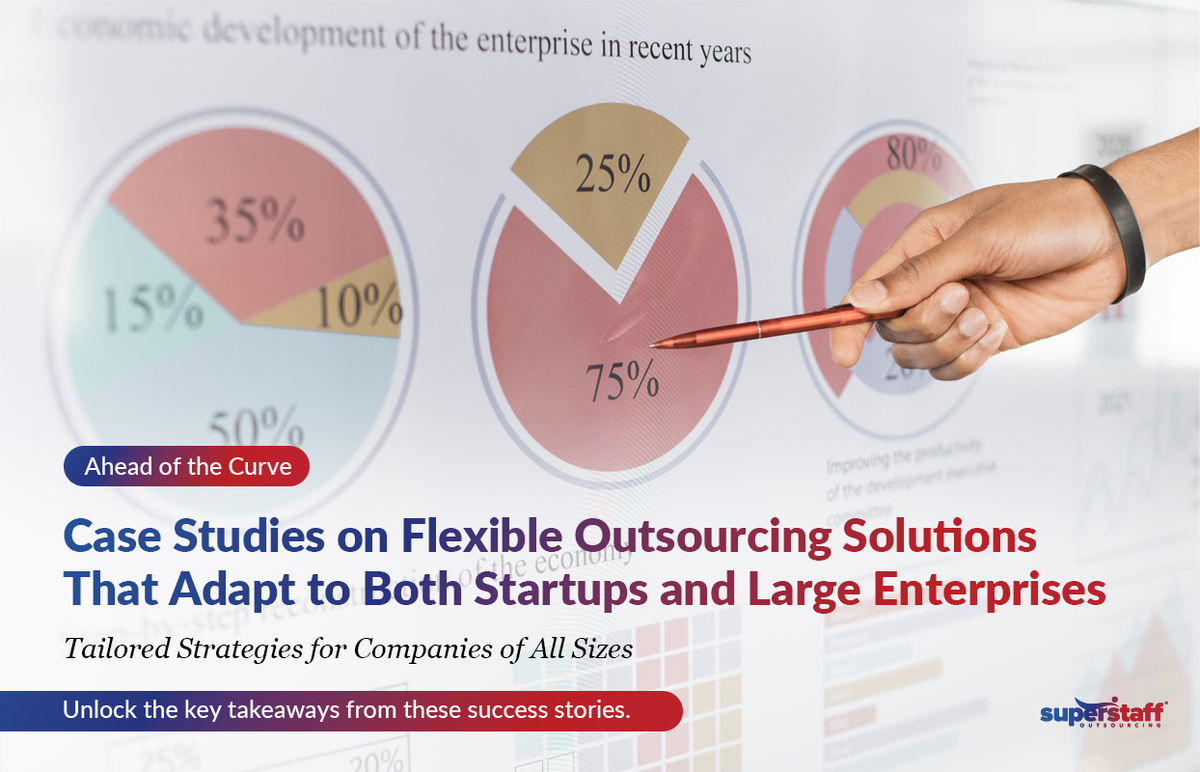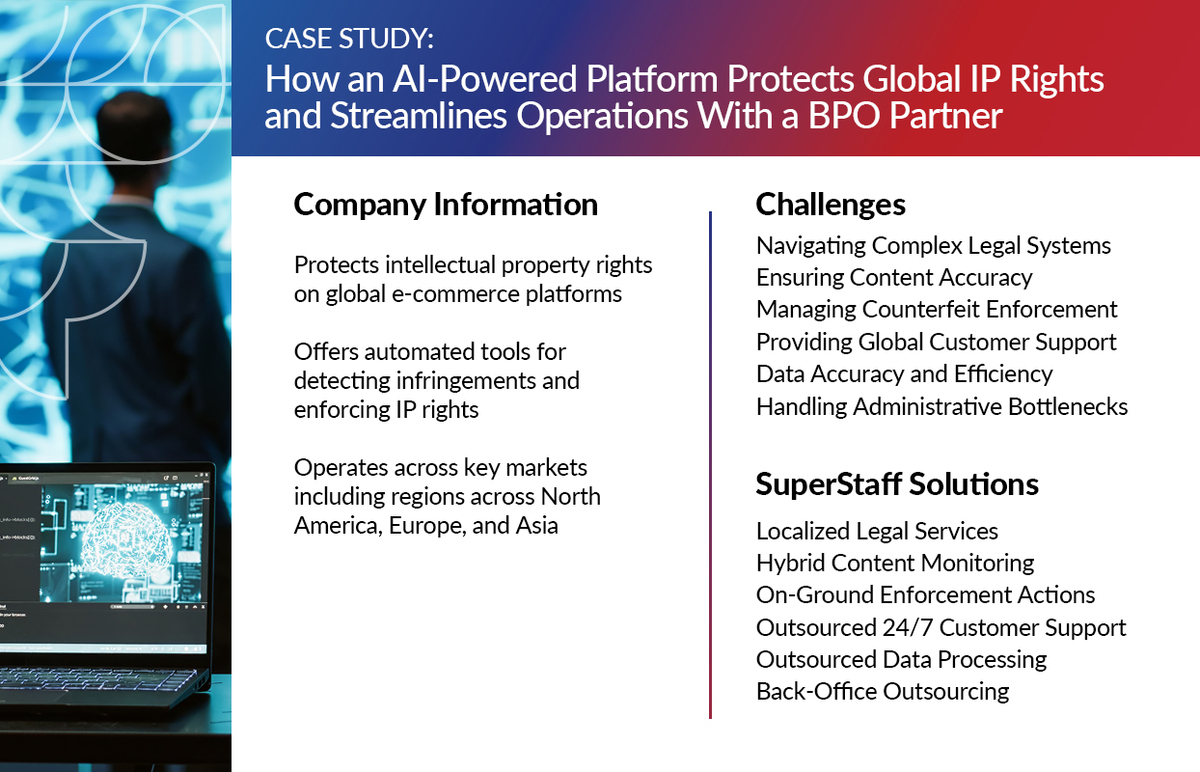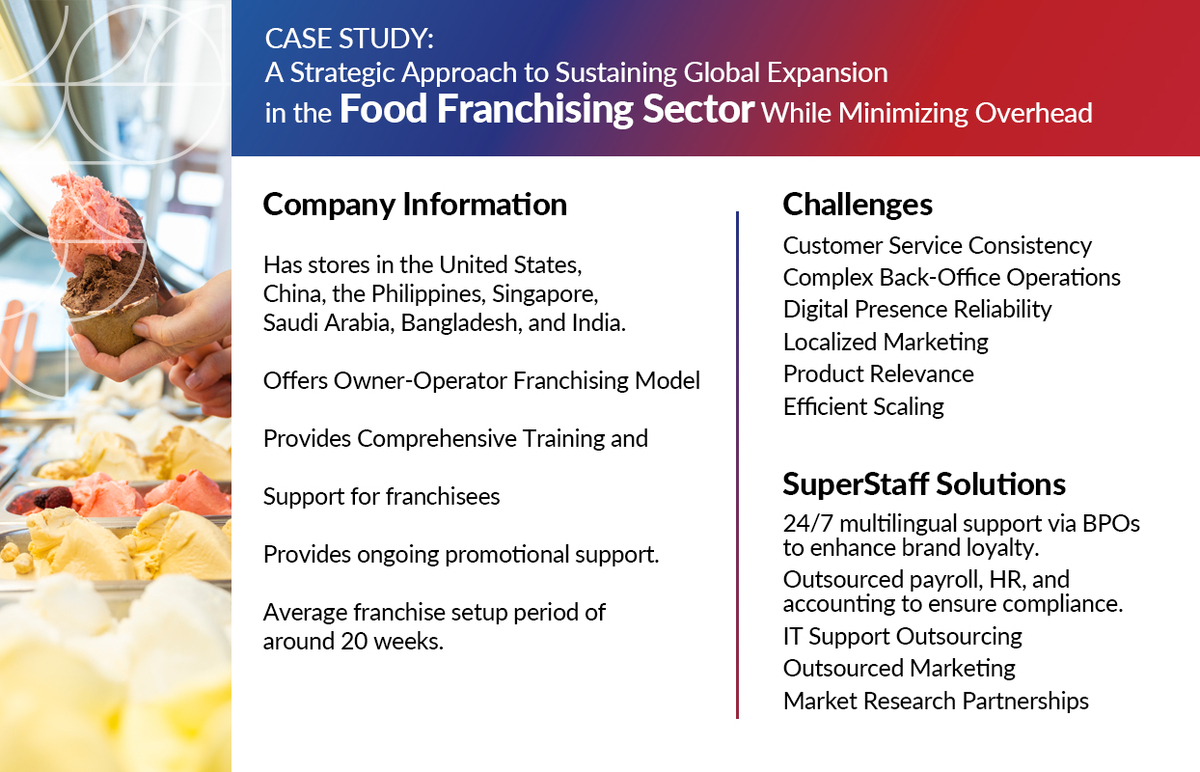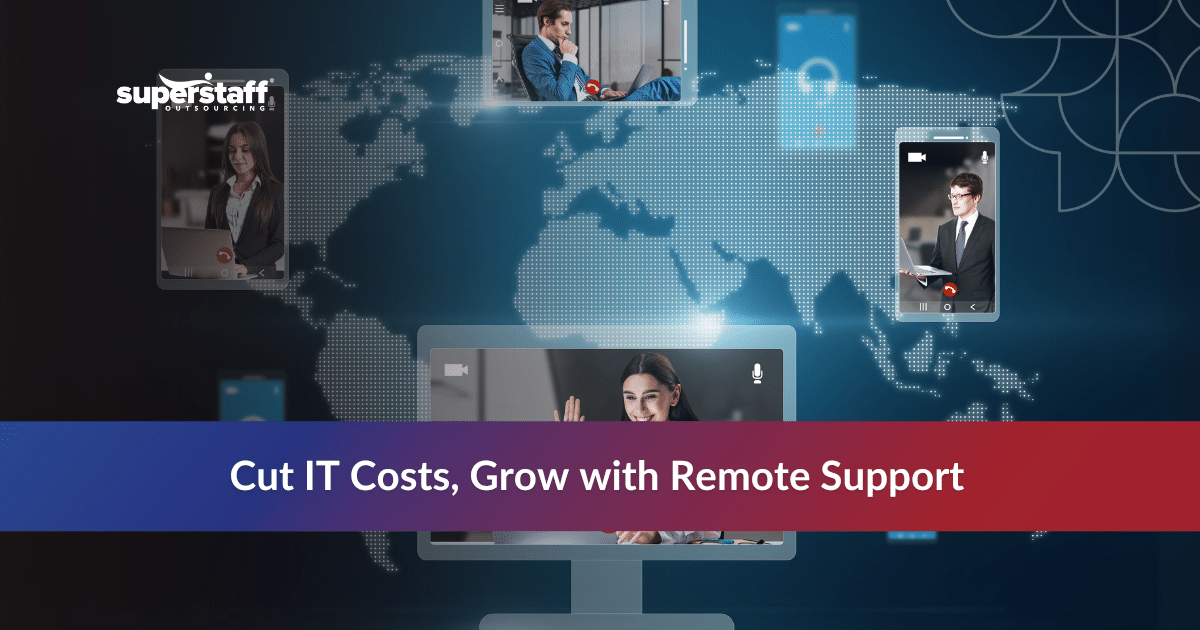
As businesses scale and evolve, their operational needs change. Whether it’s a startup navigating rapid growth or a global enterprise seeking operational efficiency, customizable outsourcing solutions offer a flexible and strategic approach to meeting these demands. From specialized functions to everyday support tasks, outsourcing can be adapted to fit the specific needs of any company, regardless of its size or stage.
In today’s fast-paced, interconnected business environment, outsourcing isn’t just about cost savings — it’s a way to access specialized expertise, streamline operations, and remain agile. Let’s explore how businesses at different stages use customizable outsourcing solutions to address their unique challenges and fuel their growth.
This article will look at three outsourcing case studies:
- Company A, a fast-growing startup developing an AI-powered IP protection platform
- Company B, a global food franchise
- Company C, a state-owned enterprise (SOE) or public sector undertaking (PSU)
Additionally, after reading this article, you can download a separate case study featuring a logistics firm and a pediatric DME provider.
AI Startup: Company A’s Global Reach Through Specialized Outsourcing

AI is now a big part of the business landscape, with a vast majority (86%) of IT leaders pointing to generative AI’s role in their organizations.
Company A, a fast-growing startup developing an AI-powered IP protection platform, is no exception. This cutting-edge firm is an excellent example of how outsourcing can be adapted to meet specific business needs. Operating in global markets such as China, Korea, and Southeast Asia, Company A has strategically outsourced critical functions related to brand protection, IP enforcement, and legal services.
These specialized fields, where local expertise is critical for navigating diverse legal frameworks and addressing counterfeit threats, benefit immensely from AI integration and strategic outsourcing.
Let’s break down how Company A leverages outsourcing to stay competitive and operationally efficient.
Legal and Compliance Services
Enforcing intellectual property rights can be particularly complex in countries like China, Korea, and the Southeast Asian region due to differences in legal systems and regional challenges. For instance, Indonesia has a dedicated Trade Secret Law, whereas Singapore bases its approach on common law principles.
Company A has recognized that having localized legal knowledge is essential to successfully navigating these issues.
It ensures regional laws and regulations compliance by outsourcing legal services to local experts. This localized approach enables the company to address specific counterfeit threats more effectively while avoiding the need to establish a physical presence in each country.
Content Monitoring and Analysis
Although Company A’s AI platform automates much of the IP protection process, outsourcing content monitoring to teams with local expertise is critical. This hybrid approach, which combines AI-backed automation with human oversight, provides both speed and accuracy in identifying counterfeit strategies or market trends that might go unnoticed by technology alone. By outsourcing manual content monitoring to regional experts, Company A can better protect its clients’ brands while leveraging the strengths of both technology and human intelligence.
Enforcement Actions
Counterfeiting is not only a digital threat but often requires real-world intervention. With the global illicit trade in counterfeit and pirated goods valued at approximately $464 billion — around 2.5% of world trade — swift and decisive action is crucial.
Company A outsources tasks like hiring local investigators or agents to collaborate with law enforcement for swift action against counterfeit goods. This on-the-ground approach ensures that Company A can combat counterfeiters even in regions where they don’t have a direct physical presence. By outsourcing enforcement actions, Company A can take rapid, localized measures to protect intellectual property, making their global operations more effective and aggressive in tackling counterfeiting.
Customer Support
With a global customer base, Company A faces the challenge of providing around-the-clock customer service. By outsourcing this function to a business process outsourcing (BPO) provider, the company can ensure seamless 24/7 customer support. This allows Company A to meet the demands of international clients without overextending its internal resources. Outsourcing customer support enhances the client experience and enables the company to focus on refining its core AI platform.
Data Processing and Analysis
While AI plays a significant role in detecting counterfeit goods, human validation is often necessary to ensure accuracy, especially when dealing with more complex cases. Company A outsources data processing tasks to ensure that its systems are constantly checked for errors and that nuanced cases receive human attention. By outsourcing this function, the company can maintain high-quality service while scaling its operations without compromising its focus on AI development.
Back-Office Operations
Administrative functions can create bottlenecks, especially for fast-growing startups. Company A has streamlined its internal processes by outsourcing back-office operations such as billing, invoicing, and HR management. This strategic move helps the company avoid operational slowdowns, ensuring that resources are focused on scaling its global IP protection platform. By relying on external providers for back-office service solutions, Company A increases operational efficiency and reduces the burden on internal teams.
Legal Process Outsourcing (LPO)
With around 12,000 intellectual property cases filed annually in U.S. federal courts — 84% of which are driven by patent assertion entities — the demand for efficient legal management is significant. However, intellectual property filings and legal correspondence with government bodies can be time-consuming and complex. By partnering with LPO services, Company A can manage these legal tasks across different regions without overwhelming their in-house legal teams. This allows them to stay focused on strategic legal matters, while external legal partners handle the routine yet crucial work related to IP enforcement. The result is a more agile and responsive legal operation that supports the company’s global objectives.
Content Moderation
Supporting an AI-powered platform like Company A’s requires ongoing content moderation to ensure accuracy. While the AI system flags potential counterfeit content, human review remains essential to verify and assess edge cases. By outsourcing content moderation, Company A adds an extra layer of oversight, ensuring that flagged content is reviewed thoroughly and that false positives or negatives are minimized. This ensures the platform operates with the highest level of accuracy and reliability.
IT Support
Maintaining a robust IT infrastructure is crucial for a technology-driven company like Company A. Outsourcing IT support ensures that its tech systems remain secure and operational without maintaining a large in-house IT team. By outsourcing tasks such as platform maintenance, security, and technical support, Company A can stay agile and responsive to any issues. This lets the internal team focus on innovation and platform development rather than day-to-day technical troubleshooting.
The Role of Customizable Outsourcing Solutions in Scaling Startups
Customizable outsourcing solutions allow Company A to manage specialized tasks across multiple regions. Whether it’s leveraging local legal expertise, providing 24/7 customer support, or outsourcing back-office operations, these tailored solutions enable the company to scale its global IP protection platform efficiently. By outsourcing non-core functions, Company A enhances its operational efficiency and focuses on its core mission: developing cutting-edge AI technology. As the company continues to grow, the ability to adapt and customize outsourcing solutions will remain a critical factor in its global success.
This example of Company A highlights how startups, regardless of their size or stage, can benefit from outsourcing as a strategic tool for growth and operational efficiency. By customizing their outsourcing approach to meet the specific needs of each region and function, startups can remain competitive and agile in an increasingly globalized market.
Global Food & Franchise Enterprise: Company B’s Operational Efficiency Through Outsourcing

Franchising has become increasingly popular among entrepreneurs. Its global market was valued at $121.36 billion in 2023 and is expected to reach $279.91 billion by 2032 at a CAGR of 9.73%.
For businesses in this landscape, outsourcing is essential for maintaining consistency across international markets while driving growth. Let’s explore how Company B, a global food franchise, leverages customizable outsourcing solutions to streamline operations, enhance efficiency, and support brand expansion.
Customer Support
With stores spanning regions such as Australia, China, the Philippines, and the United States, maintaining consistent customer service across markets can be daunting for any global franchise.
Given that 76% of online shoppers prefer brands that provide information and offer support in their native language, each region presents its own set of challenges. Company B addresses this challenge by outsourcing customer support to specialized business process outsourcing (BPO) providers.
By leveraging BPOs, Company B ensures that franchise inquiries, customer feedback, and order-related issues are handled efficiently. This approach allows the company to offer 24/7 customer service without placing excessive strain on its internal resources. The result is a seamless customer experience where franchisees and customers receive timely responses regardless of location. For a global franchise, this consistency in customer service is essential to building brand loyalty and ensuring satisfaction across diverse markets.
Back-Office Operations
For any franchise model, administrative tasks such as payroll processing, human resources (HR) management, compliance, and accounting must be managed precisely. The complexity increases when operations span multiple countries, each with its own set of regulations and compliance requirements. Company B recognizes that outsourcing these back-office tasks to a BPO is cost-effective and necessary for ensuring regional accuracy and compliance.
Outsourcing back-office operations allows Company B to focus on its core business — running and expanding its franchises — while avoiding the administrative bottlenecks that can slow growth. By offloading payroll, HR functions, and accounting tasks to an experienced BPO provider, Company B ensures that its operations run smoothly and that franchisees are not burdened with these time-consuming tasks. This approach also helps the company manage costs effectively, as outsourcing these services can be more affordable than maintaining in-house teams in each country of operation.
IT Support
In today’s digital age, a seamless digital presence is crucial for any business, and Company B is no exception. A reliable IT infrastructure is essential for smooth operations, from managing franchise recruitment and online customer interactions to handling store management systems.
For every dollar put into IT, companies will see about $3 back in revenues, showing just how financially rewarding investing in technology can be. However, maintaining an in-house IT team to support global operations can be costly and inefficient, especially when technical issues arise across different time zones.
By outsourcing IT support, Company B ensures that its digital infrastructure remains secure and operational without needing a large internal team. Outsourced IT services handle tasks such as website management, software updates, and troubleshooting, ensuring that any technical issues are resolved quickly. This approach allows the company to provide uninterrupted digital experiences for franchisees and customers, ensuring operations run smoothly regardless of location. Quick issue resolution is critical, especially for a global franchise with operations running around the clock.
Marketing and Social Media Management
Marketing plays a crucial role in driving the success of any franchise, especially when it comes to engaging with diverse audiences across different regions. Company B has a global footprint, and to resonate with local customers in each market, it must tailor its marketing strategies accordingly. However, managing marketing efforts across multiple countries can be resource-intensive, particularly when it comes to maintaining brand consistency while adapting to local preferences.
Company B outsources digital marketing and social media management to external teams to overcome this challenge. These teams run localized marketing campaigns that appeal to specific audiences in each region while maintaining the company’s global brand image. By outsourcing this function, Company B can deliver tailored marketing strategies that resonate with local customers. Outsourced teams handle tasks such as social media content creation, email marketing, and targeted advertising, ensuring that the company’s marketing efforts are efficient and effective.
Local Flavor Development
Company B stays relevant in diverse markets by introducing locally inspired flavors in collaboration with its franchisees. However, staying in tune with local trends and preferences requires in-depth market knowledge. By outsourcing market research or partnering with regional BPOs for supplier management and product sourcing, Company B gains valuable local insights that help shape its product offerings.
This approach allows Company B to introduce region-specific products that resonate with local customers without overburdening its internal team. Outsourcing market research and supplier management enables the company to focus on its core operations while tapping into local teams’ expertise that understand regional trends. This balance of global brand consistency and local adaptation is crucial for any franchise that wants to succeed in international markets.
Enterprise-Level Operational Efficiency and Global Growth
For Company B, outsourcing is not just a cost-saving measure but a strategic tool that allows the company to focus on what it does best — expanding its global brand. By leveraging customizable outsourcing solutions, the company can manage its international operations more efficiently while ensuring each franchise benefits from localized support.
Whether providing 24/7 customer service, streamlining back-office functions, ensuring seamless IT support, or running tailored marketing campaigns, outsourcing enables Company B to maintain operational efficiency and scale smoothly. Outsourcing allows it to manage costs, comply with regional regulations, and ensure consistent service delivery across multiple countries in a competitive global market.
For franchises looking to expand internationally, customizable outsourcing solutions provide the flexibility to adapt to different markets, manage operations efficiently, and drive long-term growth. By offloading specialized tasks to expert providers, businesses can focus on their core strengths and continue to thrive in an increasingly interconnected world.
Public Sector Enterprise: Company C’s Outsourcing for Digital Transformation
As the digital transformation of public services accelerates, organizations of all sizes, including government institutions, are turning to outsourcing to manage complexity, enhance operational efficiency, and focus on their core missions. Outsourcing can be a game-changer in handling large-scale public sector initiatives for e-governance solution providers like Company C, a state-owned enterprise (SOE), or a public sector undertaking (PSU). By leveraging customizable outsourcing solutions, Company C can streamline specific operations and ensure the seamless delivery of public services. Here’s how outsourcing benefits Company C’s e-governance efforts.
Customer Support and Help Desk
Government services rely heavily on public engagement, often requiring robust support systems for inquiries from citizens, businesses, and other government agencies. However, due to high demands, some agencies struggle to keep pace. This is why only a handful (8%) of Americans view the government as responsive to their needs.
Fortunately, in our case study, Company C manages many e-governance platforms, from tax filing to public utilities, and must maintain continuous user accessibility. Outsourcing customer support and help desk operations enables Company C to provide 24/7 service coverage.
By outsourcing this critical function, Company C can ensure that users have access to real-time technical assistance, navigation support, and answers to queries about various government processes. Whether it’s helping citizens with online tax submissions or assisting businesses with licensing, outsourced customer support enhances user experience without placing additional strain on internal resources. This allows Company C to focus on improving its e-governance systems while ensuring citizens and businesses have the support they need.
IT Support and Maintenance
E-governance platforms require continuous monitoring to ensure system stability and reliability. Issues such as server outages, security breaches, or software glitches can disrupt government services and diminish public trust. For Company C, outsourcing tech support and maintenance ensures that these issues are proactively managed by external specialists.
Outsourcing IT support allows Company C to offload routine technical tasks such as server monitoring, incident resolution, and infrastructure maintenance. External providers ensure that e-governance systems remain stable, secure, and scalable. This enables internal teams to focus on higher-priority tasks like software development and expanding digital service offerings. With outsourced IT support, Company C can maintain system uptime and enhance the overall security of its digital platforms, driving trust in public-sector digital services.
Data Entry and Processing
Government services handle enormous amounts of data, from citizen records and business filings to information on public utilities. For instance, the U.S. Data.gov has grown to include nearly 300,000 datasets from over 100 organizations — a steep jump from just 47 datasets when it started in 2009. With more than a million monthly visits, people rely on this data for all needs. Additionally, the U.S. Census Bureau offers over 2.5 million raw data tables through 130+ surveys and programs covering demographics and economic trends.
Managing this data efficiently is vital to providing smooth e-governance services. But digitizing old records or handling new applications can be a real time-drain. That’s why Company C turns to outsourcing for data entry and processing, ensuring everything runs smoothly and efficiently.
By partnering with specialized BPOs, Company C can ensure data is accurately processed and updated in real-time, allowing government platforms to function smoothly. Outsourcing data entry also enables Company C to handle seasonal surges in demand, such as during tax season or election cycles, without additional in-house staff. This allows Company C to focus on strategic initiatives, like developing new digital services, while maintaining data integrity and speed of processing.
Finance and Accounting Services
Managing the financial operations of a public sector enterprise is a complex task that requires strict adherence to regulatory requirements and public accountability. Payroll processing accounts receivable/payable, and financial reporting are routine but essential tasks that must be handled precisely. Company C can improve its financial processes’ transparency, accuracy, and efficiency by outsourcing finance and accounting services.
Outsourcing financial functions ensures that Company C complies with public sector financial regulations while reducing the risk of errors in payroll or financial reporting. BPO providers offer the specialized expertise needed to handle these operations at scale, allowing Company C to focus on higher-value activities such as budget planning and resource allocation. Outsourcing also helps reduce operational costs by streamlining routine financial tasks, leading to overall cost savings while improving financial management.
Human Resources (HR) and Recruitment
With 1.7 million Americans still missing from the workforce, managing recruitment can be challenging.
Fortunately, Recruitment Process Outsourcing helps Company C handle large-scale recruitment drives and HR operations for public administration projects. These projects require significant oversight for onboarding, payroll processing, and benefits administration. Outsourcing HR functions allows Company C to scale its workforce according to project demands.
Company C can handle large-scale staffing needs more effectively by outsourcing recruitment and HR functions to external providers. BPOs assist with managing employee onboarding, processing payroll, and administering benefits, allowing Company C to scale up or down as needed for various projects. This ensures that public sector projects are adequately staffed while minimizing administrative burdens on internal HR teams. Additionally, outsourcing provides flexibility during workforce fluctuation, particularly for short-term or seasonal projects.
Call Center Operations
Public sector entities often handle high volumes of inquiries about tax collection, land registration, and public utilities. Ensuring these inquiries are handled promptly and accurately is essential for maintaining public trust in government services. Company C can improve its capacity to handle citizen queries by outsourcing call center operations to experienced BPO providers.
Outsourcing call center operations allows Company C to provide citizens with faster access to information, improving service delivery and reducing wait times for government-related inquiries. BPO providers can manage large volumes of calls, emails, and chat inquiries, ensuring citizens receive timely responses to their questions about public services. This approach enhances service efficiency and reduces the workload on internal teams, enabling Company C to allocate resources to critical projects like expanding digital infrastructure.
Achieving Operational Efficiency and Driving Digital Transformation for a Public Sector Enterprise
For a state-owned enterprise like Company C, customizable outsourcing solutions offer the flexibility and scalability to manage complex public-sector initiatives. By outsourcing non-core functions such as customer support, IT maintenance, data processing, finance, HR, and call center operations, Company C can focus on its core mission of driving digital transformation and public administration improvements.
Outsourcing these operational tasks allows Company C to achieve greater efficiency, reduce costs, and improve service delivery for citizens and government entities. This ensures the company can handle the complexity of public-sector projects while maintaining high-performance standards. In an era of digital transformation, outsourcing offers a strategic advantage, enabling Company C to streamline operations and deliver the critical services that citizens depend on, all while driving innovation in e-governance at a national level.
Download a free case study here:
Outsourcing Case Studies: Success Stories That Highlight the Power of Strategic Partnerships
If you want to achieve the success of industry leaders like those we’ve discussed in our case studies, then it’s time to consider outsourcing with SuperStaff. Our team specializes in providing tailored solutions that help businesses scale quickly, manage costs, and maintain high-quality customer service. We understand different industries’ unique challenges and demands and bring the right expertise to support your growth.
With SuperStaff, you gain access to a diverse talent pool in the Philippines and Colombia, offering world-class customer support, tech services, and back-office operations. Let us handle the heavy lifting so you can focus on what matters most — growing your core business. By choosing SuperStaff, you can leverage a reliable, scalable, and flexible outsourcing solution that aligns perfectly with your strategic goals. Let’s make success a reality together.






